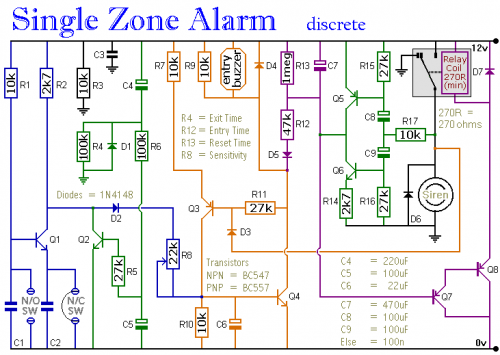FREE
circuits!
How to build A Transistor Based Single Zone Alarm
August 4, 2010 - category: AlarmDescription
This circuit features automatic Exit and Entry delays - timed Bell/Siren cut-off - and system reset. It has provision for normally-open and normally-closed switches - and will suit all of the usual input devices (Pressure Mats, Magnetic Reed Contacts, Foil Tape, PIRs and Inertia Sensors).
Schematic Diagram
If the building is not secure - the Buzzer will sound when you switch on the alarm. In which case - you should turn off the alarm and check for an open window or door etc. If all the trigger switches are intact - when you switch on the alarm the Buzzer will NOT sound. Instead - the automatic Exit delay will begin.
You have about 30 seconds to leave the building and close the door behind you. When you return and open the door - the Buzzer will sound. You then have about 30 seconds to switch the alarm off. If you fail to do so - the Siren will sound.
The maximum length of time the Siren will sound - is not fixed. The cut-off timer only starts to run when the trigger circuit has been restored. While a normally-closed switch remains open - or a normally-open switch remains closed - the Siren will continue to sound.
If you want your Siren to switch off after 10 minutes - all that's required is a Simple Modification to the trigger circuit. Then the Cut-off timer will start to run the moment the alarm is activated. And the Siren will stop after 10-minutes - regardless of the state of the trigger switches.
The Exit delay, Entry delay and Cut-off times can be changed by altering the values of R4, R12 & R13 respectively. Q5 and Q6 ensure that the Entry delay and Siren Cut-off timers always start with C7 either fully charged or fully discharged as required. If you can live with slightly less precise time intervals then leave out Q5, Q6, R14, R15, R16, R17, C8 & C9. If you don't want the Siren to Cut-off at all - then leave out D3 as well.
The sensitivity of the Inertia Sensors is adjusted by R8. Set to minimum value - a light tap will activate the alarm. Set to maximum value - a heavy blow is required. If you are not using Inertia Sensors - replace R8 with a 27k fixed resistor. If you are not using normally-open switches - leave out R1, C1 & Q1 - and fit a link between R2 and C2.
Veroboard Layout
Parts list
circuit from http://www.zen22142.zen.co.uk/ronj/sza.html





 This category
This category